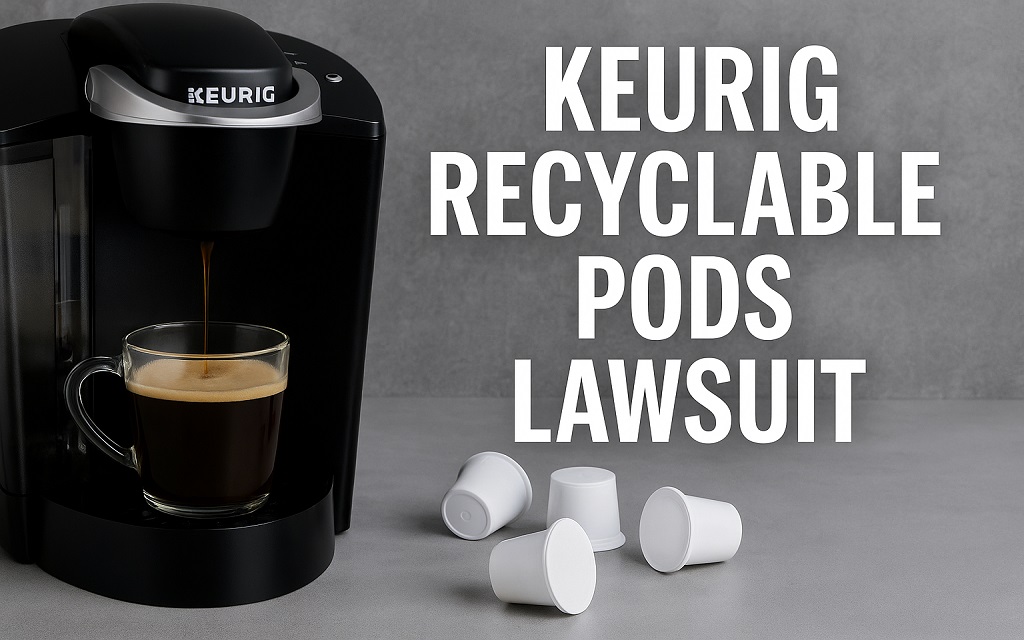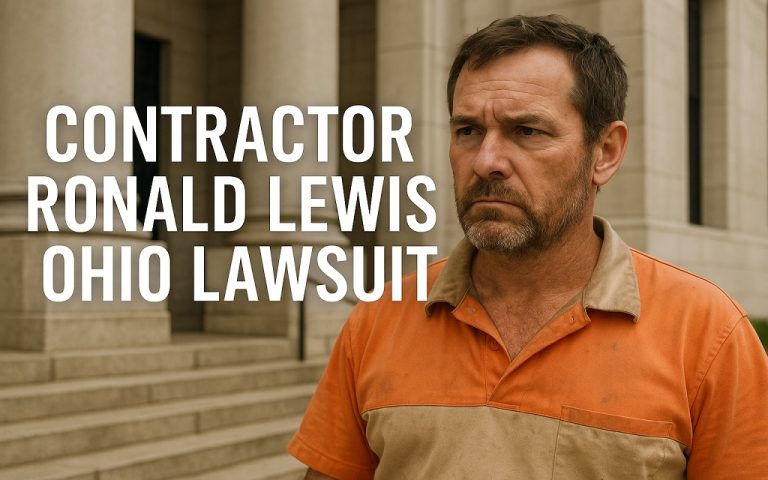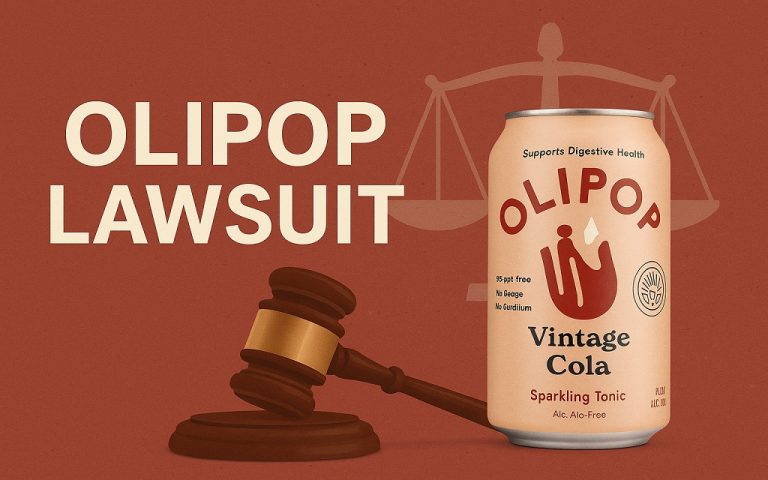One of the most well-known consumer lawsuits in recent years is the Keurig Recyclable Pods Lawsuit. The coffee company was charged in the Keurig Recyclable Pods Lawsuit with deceiving consumers regarding the recyclable nature of their well-known K-Cup pods. The majority of municipal facilities rejected the pods, despite many customers believing they could be recycled curbside.
Significant packaging revisions and a $10 million settlement resulted from the Keurig Recyclable Pods Lawsuit. Learn how the Keurig Recyclable Pods Lawsuit impacts the environment, your coffee routine, and your rights. Understanding the situation could assist you in deciding what to acquire and how to dispose of it.
What Was the Keurig Recyclable Pods Lawsuit?
The allegations of deceptive advertising were at the heart of the case against Keurig recyclable pods. According to the plaintiffs, Keurig Green Mountain advertised K-Cups as recyclable, although the majority of municipal programs were unable to handle them. The main issue was size, as recycling machines often reject items under two inches.
Despite being composed of #5 plastic, polypropylene, many K-Cups wind up in landfills. According to court documents, Smith v. Keurig Green Mountain, Inc. was filed on November 2, 2018, under case number 4:18-cv-06690-HSG, in the Northern District of California. The action cites violations of consumer protection, unfair competition, and false advertising.
What Was Part of the Settlement?
You should be aware that in early 2022, Keurig consented to a $10 million countrywide settlement. On March 2, 2022, the court granted a $10 million countrywide settlement. The matter was settled without Keurig acknowledging any wrongdoing.
It is important to note that class members with proof of purchase could claim $0.35 per 10 pods purchased between June 8, 2016, and August 8, 2022. The maximum payout per household with proof was $36. Class members without proof could receive up to $5. All valid claims received a minimum payout of $6.
Administrators of the settlement attested that payments would be lowered proportionately if the total amount of claims exceeded $10 million. The last hearing for approval was held on December 8, 2022.
Must Read: Adriana Chechik Lawsuit: TwitchCon Foam Pit Injury Explained
What Labeling Changes Did Keurig Agree To?
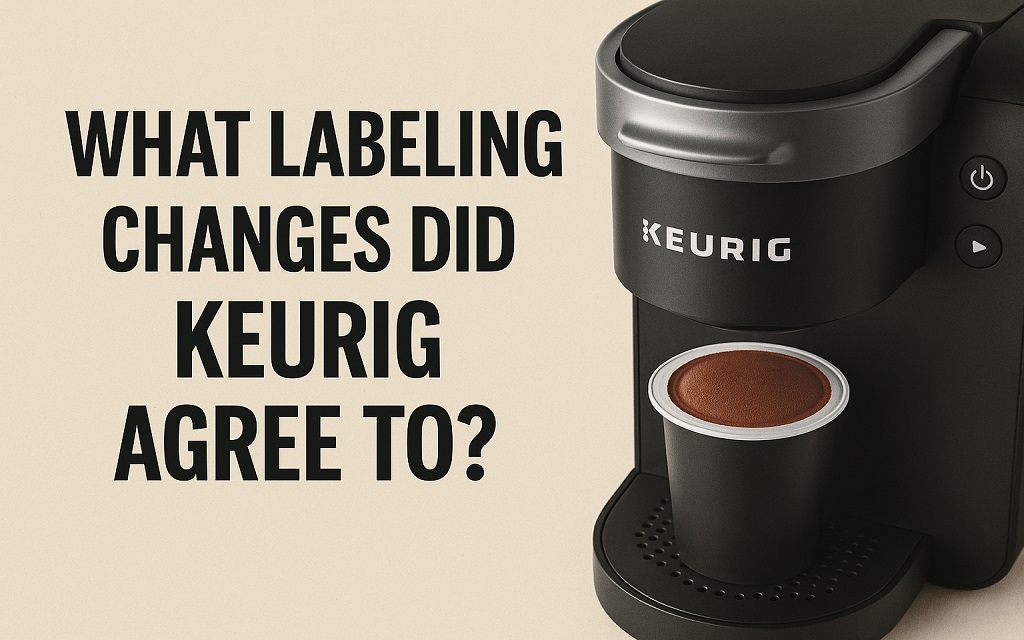
You should know that the settlement required Keurig to change how it markets recyclability. The company must now place the phrase “Check Locally – Not Recycled in Many Communities” on any packaging or advertising that claims recyclability.
It is essential to know that the disclosure must appear in a substantially larger font than before. The same qualified remark has to be included in Keurig’s promotional materials and website.
The modification is more in line with the Green Guidelines published by the Federal Trade Commission, which mandate that marketers qualify claims of recyclability if at least 60% of consumers cannot access the facilities.
Are Most Communities Now Able to Recycle K-Cups?
You should be aware that local recycling initiatives continue to determine whether K-Cups can be recycled. Many municipal recycling facilities are still unable to collect tiny plastic pods during the sorting process, even after the settlement.
Notably, a 2021 assessment by the U.S. Environmental Protection Agency found that just around 9% of all plastic waste is being recycled. Due to technical limitations, K-Cups and other small-format items are especially susceptible to waste.
You should always check your county’s or city’s recycling laws before throwing K-Cups in the trash. Some towns will accept them if the foil lid is removed and the grounds are drained. Others still reject them entirely.
Detailed Timeline of the Keurig Lawsuit
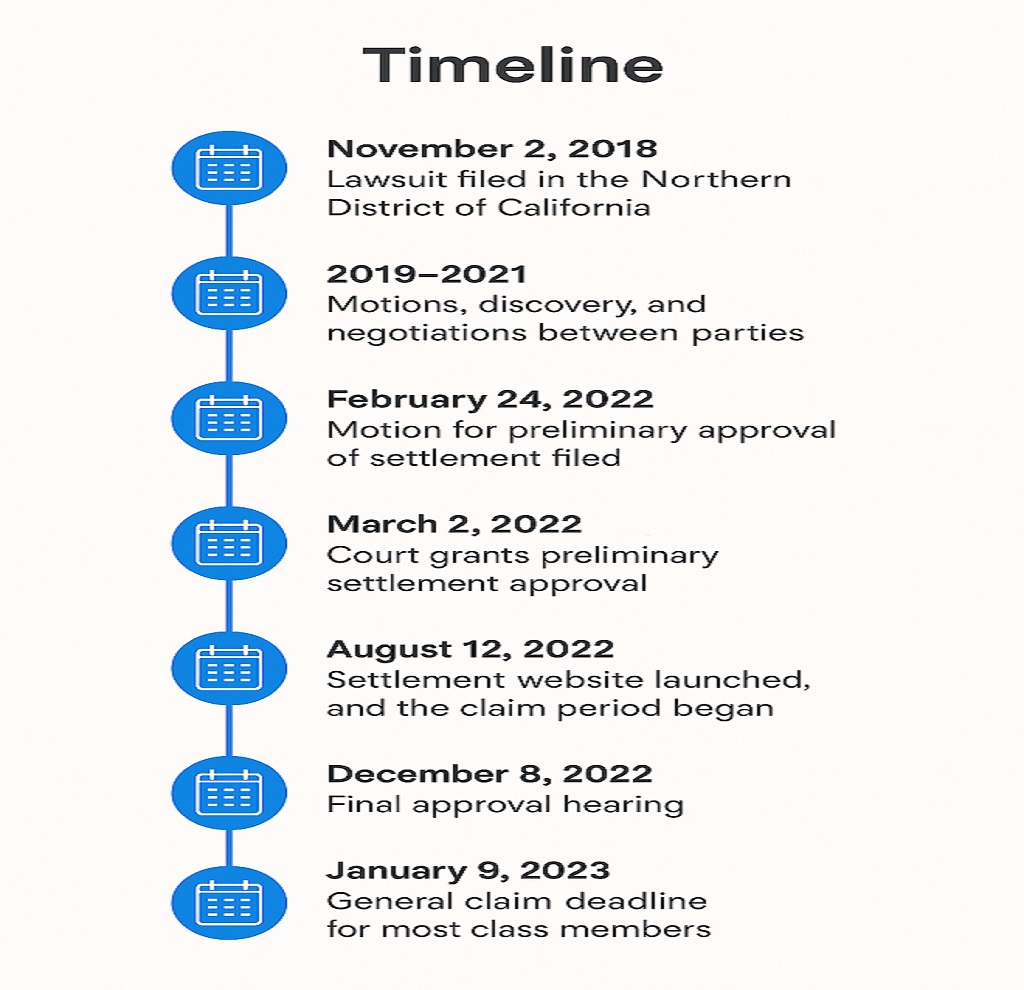
You should know that the case spanned several years. Here is the chronological breakdown:
| Date | Event |
|---|---|
| November 2, 2018 | Lawsuit filed in the Northern District of California |
| 2019–2021 | Motions, discovery, and negotiations between parties |
| February 24, 2022 | Motion for preliminary approval of settlement filed |
| March 2, 2022 | Court grants preliminary settlement approval |
| August 12, 2022 | The settlement website was launched, and the claim period began |
| December 8, 2022 | Final approval hearing |
| January 9, 2023 | General claim deadline for most class members |
| January 30, 2023 | Extended claim deadline for late-notice recipients |
Are K-Cups Recyclable in the United States Today?
You should know that K-Cups remain recyclable in theory, but not in practice, in many areas. Local acceptance rates vary widely.
It is essential to know that The Recycling Partnership reports that only 53% of U.S. communities accept polypropylene plastics. Among those, fewer than half accept small items like coffee pods.
Here are examples from various states:
- California – Los Angeles and San Diego do not accept coffee pods curbside.
- New York – This City rejects coffee pods from residential recycling.
- Massachusetts – Boston accepts clean pods with foil removed, but many surrounding towns do not.
- Texas – Houston and Dallas do not list pods on accepted materials lists.
- Washington – Pods that are washed and have the foil taken off are accepted in Washington and Seattle.
Make sure you understand the recycling laws in your area before disposing of pods in the garbage.
How Did the Lawsuit Impact Keurig’s Public Image?
You should know that the media widely covered the lawsuit. Customers started to doubt certain coffee brands’ environmental promises.
Concerns about greenwashing, for instance, were a hot issue of discussion. The case reminded customers that recyclability claims often depend on infrastructure availability rather than material type.
The case claims that single-serve coffee pods have been the target of years of criticism from environmental organizations. Concerns regarding greenwashing—the term for exaggerated or deceptive ecological benefits—were strengthened by the case.
Following the settlement, industry analysts saw a change in the single-serve coffee market. Some competitors introduced compostable or biodegradable pods. Others promoted reusable filter accessories to reduce waste.
An example comes from a 2021 Consumer Reports survey, which found that 55% of U.S. adults believed products labeled “recyclable” were accepted everywhere. The Keurig case helped correct that misconception.
How Does the FTC Green Guides Apply to This Case?
You should know that the FTC Green Guides provide marketers with rules for environmental claims. They state that marketers must qualify claims if a product is recyclable only in limited areas.
However, it is essential to know that the guides also warn against misleading symbols, such as the chasing arrows icon, if recycling facilities are not widely available.
In the Keurig case, the “Check Locally” disclaimer brought the company closer to compliance with the FTC’s position on qualified recyclability claims.
Who Qualified for a Settlement Payout?
You should know that the settlement covered U.S. residents who purchased K-Cup pods labeled as recyclable between June 8, 2016, and August 8, 2022. The class definition excluded purchases made for resale.
Claimants had to provide either proof of purchase or a sworn statement under penalty of perjury. Proof included receipts, order confirmations, or other verifiable records.
It is important to note that payouts were prorated if the total claims exceeded the $10 million fund. The settlement administrator handled verification and payment distribution.
How Do Competitors Handle Coffee Pod Recycling?
You should know that different brands take different approaches.
- Nespresso – Runs a free mail-back recycling program for aluminum capsules.
- Lavazza – Offers compostable pods in specific product lines.
- Peet’s Coffee – Sells pods certified for industrial composting.
- Third-party brands – Some produce reusable K-Cup-compatible filters.
It is important to note that each approach has limitations. Compostable pods require industrial facilities. Mail-back programs need consumer participation. Reusable filters require cleaning after each use.
What Should You Do If Your Community Rejects K-Cups?
You should be aware that you have several choices:
- Use a K-Cup filter that can be reused.
- Select brands of biodegradable pods.
- Take part in a recycling program that accepts mail-backs.
- Use pods for storage or craft projects.
It is essential to realize that even small personal changes can minimize trash, even when municipal recycling is not an option.
What Indicates That You Can Recycle Your K-Cups?
You should know that checking your local municipal recycling program is the only way to confirm acceptance. On their websites, numerous cities provide comprehensive listings of permitted plastics.
It is important to note that experimental operations have started to gather small, hard plastics from curbside systems. Even in those situations, rejection may result from contamination from foil covers or coffee grounds.
The city of Calgary, Canada, provides a helpful example, accepting clean, empty K-Cups as long as the foil is taken off and the grounds are composted separately. In contrast, Los Angeles still rejects coffee pods regardless of preparation.
How Do You Handle Used K-Cups If Recycling Isn’t an Option?
If K-Cups are not recycled in your neighborhood, you should be aware that there are other options. You can utilize loose coffee grounds while brewing by using a reusable K-Cup filter. Searching for compostable pods that independent standards have approved is an additional choice.
However, it is essential to know that some companies offer mail-back recycling programs for pods. These programs often require you to pay for shipping or participate in bulk collection.
You should also consider upcycling projects. Empty pods are used by some customers for small item storage, craft projects, and seed starting. This cannot replace large-scale recycling, but it can help cut waste in tiny ways.
Must Read: Chime Class Action Lawsuit: What You Need to Know
What Reaction Did Keurig Give to the Allegations?
Keurig denied any wrongdoing in the case, so you should know that. The business claimed that it reached a settlement to reduce the expense and distraction of protracted legal action.
However, it’s crucial to remember that Keurig has made an effort to increase the capacity of K-Cups to be recycled over time. That approach included switching to polypropylene #5 plastic. The settlement did concede, nevertheless, that local acceptance is not always ensured by material recyclability.
What Can We Learn From This Case As Consumers?
You should be aware that both consumers and businesses can learn from the Keurig recyclable pods case. It emphasizes to customers how crucial it is to confirm local recycling regulations before trusting package claims.
It is crucial to keep in mind that the case emphasizes the dangers that overstating environmental benefits poses to a company’s reputation and legal position. However, clear, qualified labeling has two advantages: it fosters trust and helps prevent lawsuits.
Look for third-party certifications at all times, such as the How2Recycle label, which provides accurate acceptance rates and preparation instructions.
What Does the Future Hold for Coffee Pod Waste Management?
You should know that technology may improve recycling for small plastics. Advanced optical sorters and robotics are being tested to capture more items under two inches.
It should be noted that states such as Maine and Oregon may impose extended producer responsibility (EPR) legislation that obliges businesses to finance product recycling infrastructure.
However, sustainable packaging is becoming increasingly in demand. According to a McKinsey report from 2022, 66% of American consumers consider sustainability when making purchases. This pressure may drive new coffee pod designs and waste reduction strategies.
Frequently Asked Questions
Can Keurig pods be recycled?
Although Keurig pods are made of recyclable plastic, most facilities do not accept them because of size restrictions.
Why did Keurig get sued?
You should be aware that Keurig was sued for promoting recyclable pods in places where they couldn’t be processed.
Can you recycle a Keurig machine?
You should be aware that local e-waste programs allow for the recycling of Keurig machines.
What happens to coffee pods that have been recycled?
You should know that accepted pods are processed, separated, and turned into new plastic products.
Are Keurig’s pods biodegradable?
Although some third-party brands sell biodegradable pods, Keurig does not.
Before recycling, do Keurig pods need to be emptied?
You should be aware that the majority of recycling programs require that pods be cleaned and emptied before they can be accepted.
Conclusion
In short, marketing claims must adequately reflect actual recycling conditions to avoid legal issues, as the Keurig recyclable pods lawsuit reminds us. You should learn about your local recycling system and go beyond packaging.
However, recyclability depends on facility equipment and market demand, so always notice statements like “Check Locally – Not Recycled in Many Communities.” Holding businesses accountable and scrutinizing vague green promises are crucial. Use compostable pods, reusable filters, or participate in take-back programs to prevent used goods from ending up in landfills.
Key Takeaways
- The Keurig recyclable pods lawsuit involved allegations of misleading recyclability claims.
- Most municipal facilities cannot process small plastic pods due to equipment limitations.
- The lawsuit ended with a $10 million settlement and required packaging changes.
- The phrase “Check Locally – Not Recycled in Many Communities” must now appear on labels.
- Before trusting packaging statements, consumers should confirm local recycling regulations.
- Reusable filters, compostable pods, and take-back initiatives can all help cut down on waste.
- Accountability for businesses promotes more honest environmental marketing.
Disclaimer: This article provides a general overview of the Keurig Recyclable Pods lawsuit, based on publicly available information, and is intended for informational purposes only. It is not legal advice.
Musarat Bano is a content writer for JudicialOcean.com who covers lawsuits, legal news, and general legal topics. Her work focuses on research-based, informational content developed from publicly available sources and is intended to support public awareness. She does not provide legal advice or professional legal services.

